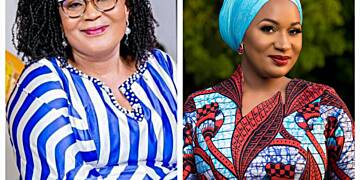A familiar scene has been playing out in recent months. Samira Bawumia, wife of presidential candidate of the New Patriotic Party (NPP) and current Vice President Mahamudu Bawumia, moves through the crowds with practiced ease. Market women reach out to grasp her hands, young people jostle for selfies, and her team carefully documents each interaction. This is modern political campaigning in action, with a spouse taking center stage in her husband’s presidential bid.
Meanwhile, the wife of Former President John Dramani Mahama and flagbearer of the National Democratic Congress (NDC) Lordina Mahama through her foundation has commissioned several maternity centers from Bole through to Nkoranza and Bodo. Her approach is quieter, more institutional, but no less significant. Through her Lordina Mahama Foundation, she continues to shape Ghana’s healthcare landscape, maintaining her influence through concrete actions rather than campaign rhetoric.
These contrasting scenes capture a fascinating moment in Ghana’s political evolution, one that raises important questions about power, partnership, and the various paths to political influence in modern Africa.
Samira Bawumia represents a new generation of political spouses in Ghana. Her approach to the 2024 campaign has been hands-on and highly visible, marking a departure from more traditional roles. She has transformed the markets, traditionally spaces of commerce, into political arenas where retail politics meets actual retail.
Most political pundits and enthusiasts on social media are fascinated by Samira Bawumia’s more American-style approach to political partnership, where the spouse becomes an active campaign asset.
Her style resonates particularly well with younger voters who see in her a modern vision of partnership, one where a wife can be both supportive and independently powerful. Her presence on the campaign trail isn’t merely about supporting her husband; it’s probably presenting a vision of modern leadership where partnerships are visible and dynamic.
In contrast, Lordina Mahama’s approach draws strength from experience and established networks. As a former First Lady, she understands that influence comes in many forms. Her focus on healthcare initiatives through her foundation demonstrates how political power can be exercised through institutional channels rather than campaign appearances.
The Lordina Mahama Foundation’s work in establishing maternity centers speaks to a different kind of political engagement one that prioritizes lasting impact over immediate visibility. Her approach suggests that the role of a political spouse can be most effective when it creates tangible change in people’s lives.
The paths chosen by both women leaders throws more light on the complex relationship between marriage and political power in contemporary Ghana and Africa at large. Coming into leadership through marriage has historically been viewed through a narrow lens, but both Samira Bawumia and Lordina Mahama demonstrate how that role can be reimagined and redefined.
The visibility of Samira’s campaign work and the institutional focus of Lordina’s foundation activities show that political spouses can craft roles that align with their personal strengths while serving larger political objectives. Their contrasting approaches demonstrate that there’s no single “correct” way to be a political spouse in modern Ghana.
Perhaps the most significant aspect of this political moment is the freedom these women have to choose their level of engagement. Samira Bawumia’s active campaigning is neither better nor worse than Lordina Mahama’s more measured approach. They are simply different strategies for different times and personalities.
This freedom of choice represents progress in itself. Previous generations of political spouses often found themselves confined to narrowly defined roles. Today’s political wives can choose how to leverage their positions, whether through direct campaign involvement or institutional channels.
As Ghana approaches its 2024 election, the contrasting approaches of these two women offer important lessons about the evolution of political partnership. Their different styles suggest that future political spouses might have even more freedom to define their roles.
The success of both approaches, Samira’s high-visibility campaigning and Lordina’s institutional focus demonstrates that political influence can be exercised in multiple ways. This diversity of approach enriches Ghana’s political landscape and offers models for future political spouses to consider.
Ultimately, with the contributions of Samira Bawumia and Lordina Mahama whichever strategies win, let’s not have people denigrate the office of the First Lady and question their commitment to Ghana’s progress.
For me as a feminist watching these two great women, I have come to the realisation that there is no single template for political partnership. Their contrasting approaches enrich the political landscape and contribute to a more nuanced understanding of leadership, partnership, and power in contemporary Ghana.
Whether through the immediate energy of campaign appearances or the lasting impact of institutional work, both women are writing new chapters in the story of political partnership in Ghana. Their different and equally valid paths shows that in modern democracy, there is room for multiple approaches to power and influence and that diversity of approach ultimately strengthens the political process itself.
Ultimately, it’s a win for women!




















